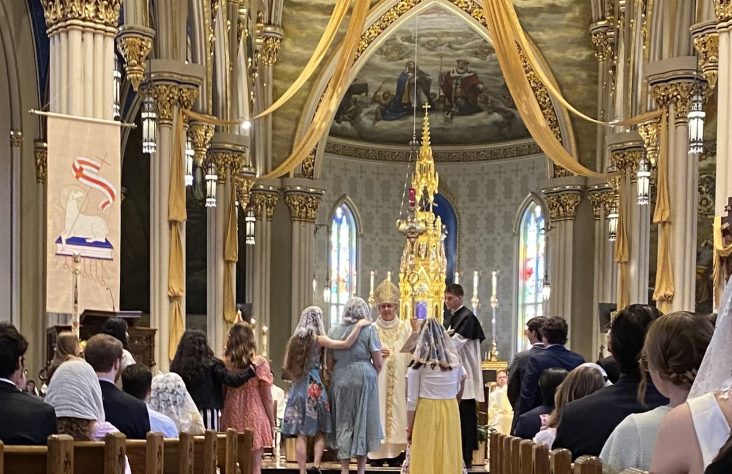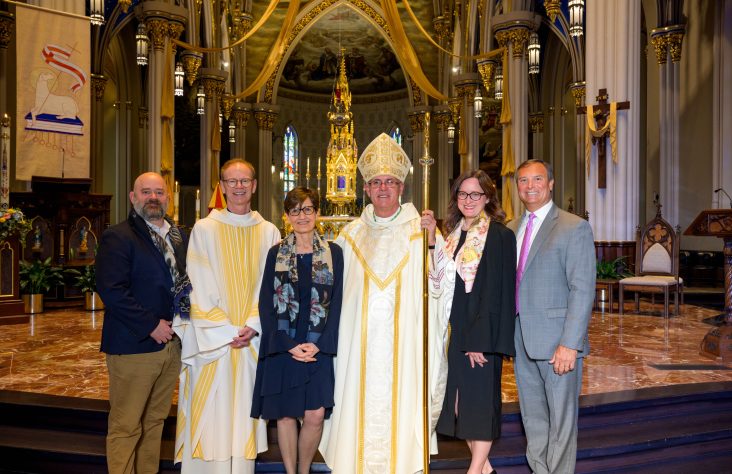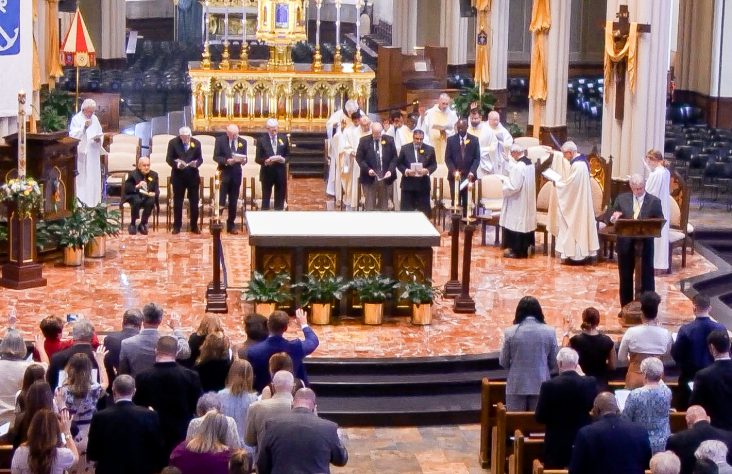October 24, 2023 // Diocese
Masses Offered to Help Faithful Obtain a Plenary Indulgence
As the Church prepares to celebrate the solemnity of All Souls’ Day on Thursday, November 2, Catholics around the world understand that they have a responsibility to pray for the dead. What many of the faithful might not know, however, is why the Church calls us to pray for the departed souls in purgatory who are being purified of their past sins so as to one day be united with Christ in heaven.
Bishop Rhoades offers an explanation
On “All Souls’ Day, we remember in prayer all our brothers and sisters who live in this state of purification,” Bishop Rhoades said in a past homily marking the solemnity. “The beautiful and profound doctrine of the Communion of Saints reminds us of our ecclesial solidarity, not only with the saints in heaven, but also with the souls in purgatory. We are all part of the Mystical Body of Christ: the saints in heaven, the souls in purgatory, and we the pilgrim Church on earth. How does this solidarity work? Through prayer and love! We can offer up prayers and good works on behalf of our brothers and sisters in purgatory. Indeed, we have a holy obligation to pray for the dead who may need final purification in order to enter the joy of heaven. The Church has always recommended prayers for the dead.”

Joshua Schipper
Bishop Rhoades stated, “Indeed, we have a holy obligation to pray for the dead who may need final purification in order to enter the joy of heaven. The Church has always recommended prayers for the dead.”
During the first week of November, in conjunction with the celebration of the solemnity of All Souls’ Day, the Church, through the mercy of God, offers the faithful an opportunity to obtain a plenary indulgence for the “remission of the temporal punishment due to sins whose guilt has already been forgiven,” according to Indulgentiarum Doctrina, Pope St. Paul VI’s 1967 apostolic constitution on indulgences that helped to renew the practice upon the suggestion of the Second Vatican Council.
A plenary indulgence is granted, under the normal conditions, for anyone who, in a spirit completely detached from sin, visits any cemetery and prays for the dead from November 1-8. One plenary indulgence can be gained on each of these days applicable to a soul in purgatory. It is important to note that being “completely detached from sin” does not mean being free from sin; rather, it means there is no sin the one seeking to obtain an indulgence is unwilling to give up.
Along with praying for the dead at a cemetery, one must also complete the following three conditions to gain a plenary Indulgence: One must give a sacramental confession within 20 days of All Souls’ Day, partake in Eucharistic communion on the day of the visit to the cemetery, and, also on the day of the visit, offer prayers for the pope’s intention (for example, an Our Father and a Hail Mary).
To help the faithful in obtaining this indulgence, four Masses are being offered at the Catholic Cemetery on Lake Avenue in Fort Wayne during the first week of November.
• Thursday, November 2, at noon, celebrated by Bishop Rhoades.
• Friday, November 3, at 1:30 p.m., celebrated by Father Tom Shoemaker, Pastor of St. Charles Borromeo Church.
• Monday, November 6, at 2 p.m., celebrated by Father Brian Isenbarger, Parochial Vicar at St. Vincent de Paul Church in Fort Wayne.
• Wednesday, November 8, at 1:30 p.m., celebrated by Father Michael Ammer, Parochial Vicar at St. Jude Church in Fort Wayne, and Father Wimal Jayasuriya, Pastor of St. Mary Mother of God.
In a 2020 article in Today’s Catholic, Father Mark Gurtner, Vicar General of the Diocese of Fort Wayne-South Bend, offered an explanation of indulgences. He wrote: “When we are sorry for a sin, that sorrow means that we regret doing the sin, that we intend with God’s help to do the best we can not to do the sin again, and that we have the intention to make up for the sin. The intention to make up for sin means that we have to be willing to right the wrong that we did. … With every sin, we hurt someone. Indeed, we hurt the whole Body of Christ. So, our sorrow for sin must include an intention to make up for the wrong to the whole Body of Christ that we have done. Jesus forgives us freely. That is why He died on the cross for us, so that our sins could be forgiven, but, once forgiven, we are asked by God to make up for the wrong that we did. … Our sins do great damage to individuals and to the body; more damage, maybe, than we could ever make up in this life. So, God in His great love and mercy has provided a way for the damage that we have done to be made up for. That is what an indulgence is. God ‘indulges’ us – that is, He wipes clean even the damage that our sins have caused. Through an indulgence, God uses the infinite good offered Him by Jesus, Mary, and the saints, and applies that good to us as a making up for our sins. What a beautiful sharing in the Mystical Body of Christ!”
The best news. Delivered to your inbox.
Subscribe to our mailing list today.






